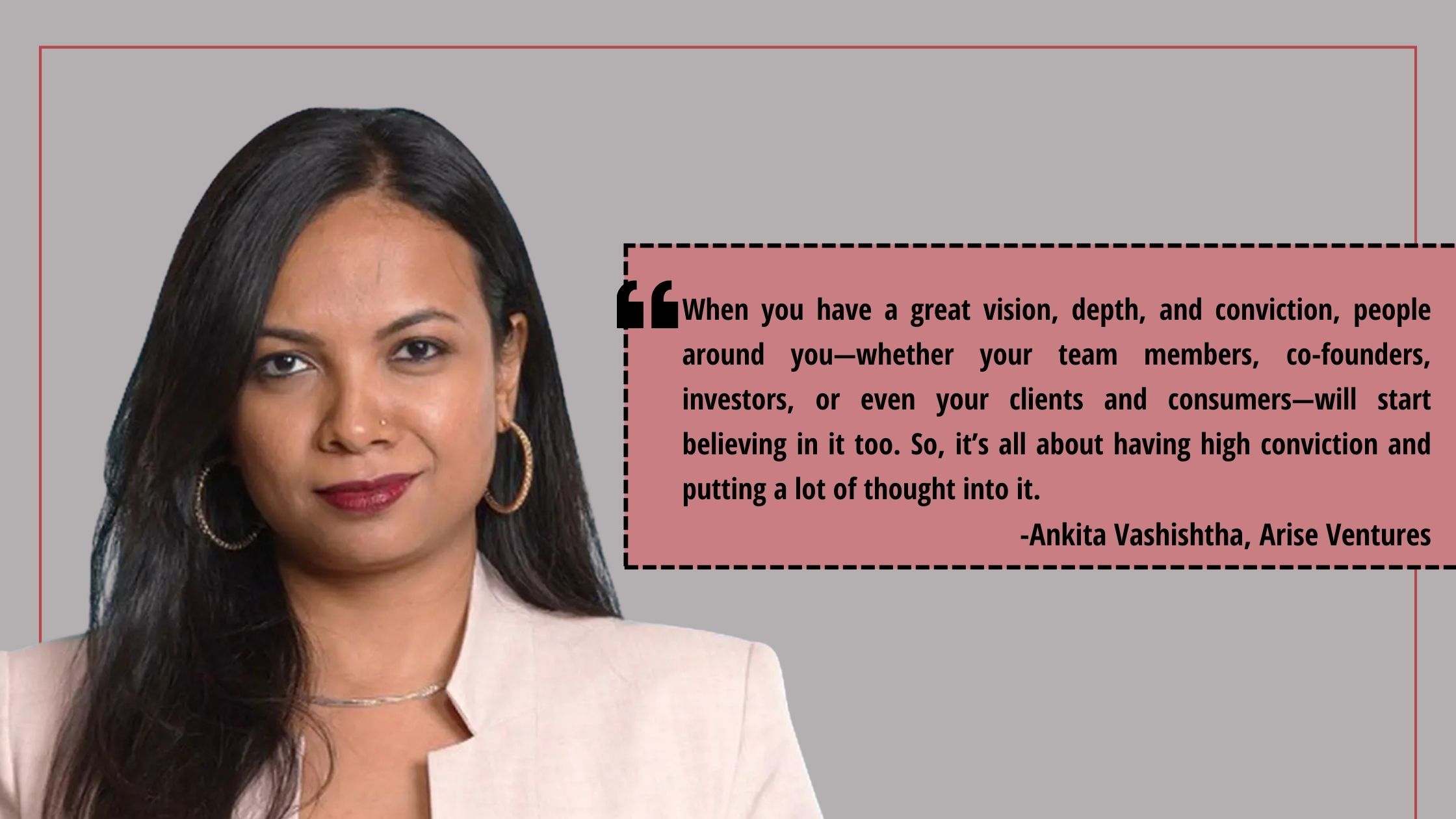AsiaTechDaily – Asia's Leading Tech and Startup Media Platform

Scaling Global Startups: Ankita Vashistha on Arise Ventures and the Future of VC
Ankita Vashistha, founder and managing partner of Arise Ventures, has expanded her investment portfolio with the launch of a new venture capital platform. This platform focuses on tech startups in the consumer, climate, and enterprise sectors. Arise Ventures marks her third fund, following the success of the Saha Fund and StrongHer Ventures. To date, Arise Ventures has invested in over 50 startups, including notable names like Licious, Uniphore, CultFit, and Phenom.
With over 15 years across private equity, venture capital, and entrepreneurship in the UK, US, India, and Singapore, Ankita’s investment lens is informed by rich global experience. What started as a passion for finance and economics eventually led her to early-stage venture capital—driven by a fascination with how innovation, capital, and founders converge to solve big problems.
“I’ve always been curious about how businesses scale and what role capital plays as a catalyst,” Ankita said. “But what really pulled me into VC was watching founders innovate from scratch.”
Her fund, Arise Ventures, is focused on early-stage startups—primarily from pre-seed to Series A. What sets it apart is its intentional focus on equitable representation and founder-first support. “We ensure that at least 50% of our portfolio is led by women founders,” she added.
In an exclusive conversation with AsiaTechDaily, Ankita opened up about her journey across three funds, investing in several tech startups—including several unicorns—and her mission to empower women entrepreneurs while scaling global tech ventures.
Ankita, as an active investor in tech and a supporter of women entrepreneurs, what are the core values or investment philosophy that Arise Ventures follows when backing women-led startups or tech ventures?
Yeah. So, for example, just to clarify — Arise Ventures is an early-stage tech fund. As we’ve matured in how we invest and engage with startups, we’ve developed an approach that’s almost like a private equity style within venture capital.
Of course, like any fund, the idea has to be unique and scalable. But we also evaluate whether the company is scaling only domestically — for example, is it a consumer brand just for India? Or is there a global outlook or opportunity?
Many of our enterprise AI or SaaS companies are typically building out of India but aim to sell to Western markets — the US, UK, etc. One of our key evaluation criteria is: can we bridge the India-to-global gap? Can we help open that access? We also consider whether a company has a female founder. Not all companies we invest in must have women founders, but we aim to maintain an equitable portfolio.
Another important aspect for us is the value we can add. Beyond opening up global market access, we focus on opening up client access. For example, if it’s an enterprise AI or SaaS company, can we connect them to their first five clients in the US? If they’re a consumer brand building in India, can we connect them to the largest enterprises and marketplaces in India for distribution?
So it’s not just about evaluating based on returns or the quality of the investment. Every good investment should be a strong one, but we’ve realized we can help our companies grow faster if we actively support them in reaching clients and consumers. We now only invest in companies where we can take an active role in helping them figure out and sell into their market. That, in turn, helps the company accelerate and leads to better returns for both founders and investors.
That’s something we focus on beyond what most funds typically do.
Ankita, as an active player in the tech, AI, consumer, and healthcare sectors, what aspects of these industries excite you the most?
Yeah, I mean, of course, what has been so exciting is just how digitalization in India has really helped us as a nation leapfrog. I think something like COVID actually provided a great leapfrog moment where suddenly we were able to shift consumer behavior. For example, when it comes to healthcare, there used to be a time before COVID when I didn’t think anyone wanted to talk to a doctor online or over the phone. But after that period, it became very normal to talk to a doctor remotely.
What that enabled is that, of course, we are very privileged in tier-one cities to have access to doctors and hospitals whenever we want to. But the majority of India—70%—lives outside of these cities and doesn’t always have that access. So, we’ve now leapfrogged into making health tech services and healthcare available to the masses of India. That is what excites me—how do we solve for healthcare for all?
Then we talk about the premiumization of consumer brands. Today, it’s not just limited to what we see in tier-one cities. Thanks to digitalization and everyone having access to 5G-powered smartphones, people are looking at what’s happening on Instagram or online, and everyone wants to see, feel, or consume what they see. We are a very aspirational population. We want to be, so a lot of aspirational brands are being birthed in India.
There used to be a time when we only wanted to wear Western brands like H&M or Zara. But now the exciting thing is that we’re able to create homegrown brands in India that globally people want to consume. The fact that someone sitting even in a tier-three city can now order a great brand online, and wants to wear branded products or consume high-quality skincare, is incredible.
The best example I give people is that a company like Minimalist, a farm-based skincare company out of Jaipur, was able to sell to Unilever for 3000 crores within just four to five years. That’s an amazing story coming out of India. So, all of this in terms of consumer and healthcare is really exciting.
On the enterprise side, because we’re a country with great engineering talent, we know how to build things with frugal innovation. We’re now able to build great IP-patented software products out of India that people anywhere in the world can consume. It’s not just limited to India. Today, we stand at a point where anything we build can now be sold globally. That’s the power of India.
With AI becoming a dominant force in the market, what key factors do you look for when evaluating an AI startup for long-term potential, particularly in terms of sustainability and defensibility?
Yeah, AI is essentially where the internet was years ago, or having a website—it’s just as fundamental now. To be relevant, you have to use AI, just like you had to have a website before. AI is simply a much better way of doing things.
As an investor, we approach AI with a very critical lens. Since everyone is using AI, it’s no longer a differentiator in itself. If a company is AI-driven, it’s almost like saying, “We have a website.” That’s the baseline now. Whether you’re a consumer company, you’re probably using AI to track consumer behavior on your website—what they buy, when they buy, and their preferences. Essentially, everything today has AI in it.
When we evaluate AI-first companies, we dive much deeper because we assume that AI is a given for every company. There are AI-enabled tools everywhere, but we’re also looking for deep-tech companies that are building core AI applications. For instance, one of our portfolio companies in computer vision uses deep machine learning to track movements in real-time.
For example, a company like ESPN can leverage that software to see what players are doing during a live match and deliver real-time data to coaches or even to the audience. So, when we evaluate AI companies, we go deeper and ask, “How are they using AI to build a truly useful application that solves a unique problem?” Basic AI should already be integrated across industries. What we care about is how you’re applying AI in a new or impactful way.
As a deep-tech AI company, how are you using cloud-based machine learning, algorithms, or other technologies to create something innovative? The application of AI is what matters, not just the fact that you’re using AI. Based on our focus areas—whether it’s health tech or cybersecurity—we want to understand how AI’s application benefits consumers and enterprises before we decide to invest.
Your VC portfolio has a global perspective. When assessing a startup with international aspirations, what criteria make you believe it has the potential to succeed globally? Additionally, are you particularly focused on the APAC region?
Yes, as I mentioned earlier, it really depends on the business model and what the startup is trying to build. For instance, the global applicability is often more evident in enterprise AI and SaaS, as these are tech products that can be used by enterprises—whether medium-sized or large. We also evaluate the founder’s capabilities in scaling the product to suit a Western mindset.
From a consumer perspective, it’s a bit different. We need to assess whether the product is only built for the domestic Indian market or complementary markets, or if it has the potential to go global. So, it’s about understanding the business model and how we can help the founder and team build out a presence in the US—particularly in marketing and sales—to help scale globally.
Yes, we are also interested in the APAC region. Our previous fund was domiciled in Singapore, so we have several investments based there. These could be companies located in Singapore but doing business globally, or companies based in Asia looking at markets such as India, Vietnam, or the Philippines. So, yes, we’ve definitely made investments in the region.
Ankita, having reviewed numerous pitches, what are some common mistakes or oversights that founders often make when fundraising?
I think one of the most common things I notice is that sometimes founders are very technical and so focused on the product they are building that they struggle to present the business model correctly. This is where we have to mentor them on how to make a strong sales pitch and be great storytellers. I believe this is an essential skill for any founder, and we emphasize this a lot with the founders we work with. Some of them are very tech-focused or product-focused, so they end up talking a lot about the technical aspects and miss explaining the business model and the vision. That’s something we help them work on.
Also, founders need to understand that investors are investing in their vision. That vision has to be big because the investor is putting their money into the business, and at some point, there are exits or returns expected, at least for the investor. After all, the investor has raised money from someone else.
When a founder pitches a very small story or a small market, it doesn’t excite the investor because it doesn’t align with their expectations. So, it might not even be a VC-investable business. Founders need to understand the scale their business should have and how to present their business model to be appealing to VCs. Sometimes, a business might not need VC money, but understanding the investor’s perspective is crucial. They should also clearly communicate their vision and how they plan to scale.
Additionally, understanding competition is key, and this is something that is sometimes overlooked. In today’s world, where so many people are building similar products, and it’s easier to create, it’s unrealistic for a founder to say they have no competition. It’s important to understand who your competitors are, where they’re coming from, and how you differ or complement them.
These are the aspects that need more attention when founders pitch. As investors, we’re always looking at how a founder is different and how they plan to implement their idea faster and better. There could be 10 or 20 people doing the same thing, but we focus on how capable the founder is in executing it well.
If startup founders were to approach you for investment or advice, what key piece of advice would you offer them?
For me, it’s about thinking big and being bold. Also, take a step back and ask yourself: why am I doing this? What problem am I really solving? That’s something you have to deeply understand. Think about a problem statement that addresses an everyday issue for many people at scale. Always think in terms of scale, and think deeply about the problem you’re solving. Then, of course, be extremely bold and vocal about it. Tell everyone about it and go after it because you have to be your own cheerleader.
When you have a great vision, depth, and conviction, people around you—whether your team members, co-founders, investors, or even your clients and consumers—will start believing in it too. So, it’s all about having high conviction and putting a lot of thought into it.
India’s startup sector has seen both ups and downs. As an investor, how do you cut through the noise and identify entrepreneurs who are truly focused on scaling their startups? Additionally, how do you assess the role of networking in today’s investment landscape?
This is a very apt and good question. Being part of the industry, I’ve always been very particular about cutting through the noise. I’ve been in this space for quite some time now, and I’ve seen how the market and ecosystem have evolved. When I was working with previous funds, there were only a handful of funds, and there were not so many founders, unlike today. It was harder to be a founder back then.
Fast forward, the great thing is that now anyone can be a founder, which is amazing. But it also means more work and diligence for us as investors. Just recently, I was talking to someone about how difficult it is to find a truly good, ethical founder. Everything may look great on the surface, but you have to dig much deeper. Over the years, we’ve evolved our investment style to be very hands-on, and that’s because it’s critical to have good communication with the founders to avoid issues like what’s happening in the ecosystem today.
We often invest at early stages—seed, Series A, and sometimes Series B—and then stop. New investors then come in, and the founders raise a lot of money. What happens is that the early-stage investors start relying on late-stage investors to do their homework, diligence, and governance. Often, it depends on how big or small the fund’s portfolio is. For larger funds, a small investment might be insignificant, but for smaller funds, it can be more substantial.
In this scenario, what happens is that between investors, someone is always piggybacking on another, and no one is doing their due diligence. As a result, founders sometimes get carried away. What’s critical is that, regardless of the size of the investment, it’s essential for the fund manager to communicate with the founders. If you’re hands-on and involved in the business, you’ll always stay in touch with the founders and have more awareness of what’s going on within the company.
A passive, spray-and-pay method of investing doesn’t work. It’s a matter of luck if it succeeds, but if not, you end up stuck. Doing proper diligence and maintaining strong communication with the founders is crucial. It’s also important for founders to realize they need to report back to their early investors, even after bigger investors come on board. That attitude and ethical approach are critical.
There must be transparency, regular reporting, and communication for everyone’s benefit. Founders shouldn’t take it personally when we ask questions—it’s a way for us to support them. The more data a founder provides, the better we can help them. If they communicate an issue today, maybe we can help resolve it, rather than waiting six months until they’re about to run out of runway.
That’s why, for us, we only invest in founders that we are very comfortable working with. If we don’t believe we can work with them, we won’t invest, even if top-tier VCs are already backing them. We invest only when the founder values our involvement beyond just the capital we bring—whether it’s our network or the value we can add. There needs to be mutual respect and understanding.
We don’t do FOMO investing. We don’t invest blindly. Being involved and adhering to governance is vital. If you can’t have that open conversation with the founder, it’s not a good sign.
Ankita’s approach to venture capital, particularly her focus on AI, tech startups, and empowering women entrepreneurs has shown a deep commitment to supporting innovation and growth. Her insights into the key factors for identifying long-term potential in startups, as well as her strategies for navigating the evolving landscape of venture investments, offer valuable lessons for both emerging entrepreneurs and investors. With a global perspective and a focus on sustainability and scalability, Ankita and Arise Ventures are set to continue driving impactful change in the startup ecosystem.



